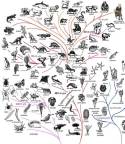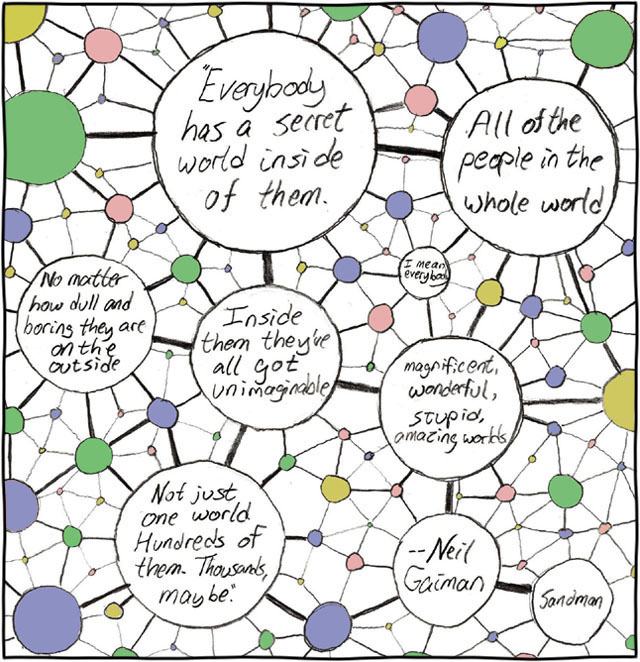A (Somewhat) Brief Introduction to Evolution
 The other night, we went out to eat with some friends. I forget why, but for whatever reason my daughter was going through, with our help, trying to think up a mammal for every letter of the alphabet (aardvark, bear, cat...) Well, for P she picked platypus, so when the game was all over, it got us to talking about them. And I foget exactly how the next part came up, but the guy I was talking to brought up that he couldn't see how they were related to other mammals, and that he really doubted the whole theory of evolution. I tell ya what - get a couple beers in me and then tell me you don't accept evolution, and just see what type of conversation gets going. Boy, was it fun. Unfortunately, I don't think I did much convincing. It had nothing to do with the beer, but a whole lot to do with the fact that discussions like that are basically my word vs. your word. Considering that I'm not a biologist or in any related field, and it makes my word worth that much less. So, I decided to write up an e-mail to send him, along with links to lots of sources backing it up. Once I got through with typing it, I figured that it made for a decent general introduction to evolution. Maybe at some point I'll clean it up and make a good essay out of it, but even in its rough e-mail form, I figure it makes for a decent blog entry. So, if you want to read it, go head below the fold.
The other night, we went out to eat with some friends. I forget why, but for whatever reason my daughter was going through, with our help, trying to think up a mammal for every letter of the alphabet (aardvark, bear, cat...) Well, for P she picked platypus, so when the game was all over, it got us to talking about them. And I foget exactly how the next part came up, but the guy I was talking to brought up that he couldn't see how they were related to other mammals, and that he really doubted the whole theory of evolution. I tell ya what - get a couple beers in me and then tell me you don't accept evolution, and just see what type of conversation gets going. Boy, was it fun. Unfortunately, I don't think I did much convincing. It had nothing to do with the beer, but a whole lot to do with the fact that discussions like that are basically my word vs. your word. Considering that I'm not a biologist or in any related field, and it makes my word worth that much less. So, I decided to write up an e-mail to send him, along with links to lots of sources backing it up. Once I got through with typing it, I figured that it made for a decent general introduction to evolution. Maybe at some point I'll clean it up and make a good essay out of it, but even in its rough e-mail form, I figure it makes for a decent blog entry. So, if you want to read it, go head below the fold.
I realize that for a blog entry, most people wouldn't consider 7 printed pages as "brief." However, for a concpet like evolution, for which there are countless journal articles published every month, and entire popular books devoted to a field as narrow as the evolution of language in a single lineage, 7 pages does seem fairly short. Also, while I would normally include verbatim copies of e-mails in block quotes, this is long enough that I figured I'd make it easier to read by posting it without a block quote.
Disclaimer: I am not a biologist.
[start of e-mail]
That was a good discussion the other night at Buffalo Wild Wings, but it's a pretty difficult topic to address by just talking about. I figured I'd send some follow up information so I could list sources, and you don't have to take my word for some of the things I was saying.
First, I guess I should address what is actually meant by "evolution." First, there's the idea of common descent with modification - the idea, for example, that a house cat and a lion both have a common ancestor, and that over many, many generations, one lineage evolved into Felix, while the other evolved into the king of the beasts. Then, there are theories as to how that happened. Natural selection, the most well known, and possibly the main driving factor, is one of those theories - explaining how certain mutations propagate while others are weeded out. There are also other theories, including sexual selection and genetic drift, not to mention theories on how speciation occurs, from allopatric to peripatric to parapatric to sympatric. And there are still further theories, like Lamarckian evolution, which have been discredited. It's important to separate common descent and proposed phylogenies (family trees) from the theories describing the mechanisms of evolution. It's a bit like gravity - separating the observation that all matter is attracted to other matter, from theories like relativity which describe the mechanisms of how that happens.
Next, I guess I should address how we can be confident about evolution in general. I'm going to cheat on that one and recycle something I already wrote. Thanks to my website, I got into an e-mail discussion with a guy that rejected evolution based on a literal interpretation of Genesis. We went back and forth a little bit, and I ended up expanding one of my responses to him into a full blown essay, which I've attached to this e-mail.
[06-Confidence in Historical Knowledge.2008-03-28.pdf - the essay attached to that e-mail]
You were also asking about our ancestors - what fossil evidence there was. I guess this is a good time to bring up another point - what fossils should we expect to find? Fossilization is a pretty rare event. When most organisms die, they get eaten and decomposed, and there aren't any recognizable remains. It takes a special set of circumstances for remains to get covered up quickly enough that they don't decompose, but gently enough that they don't get dashed to pieces, and it's even rarer still for this to happen to a nearly complete skeleton/tree/whatever type of organism, and not just bits and pieces. It's usually some form of sediment that gets deposited over the carcass, which then hardens into sedimentary rock, while the remains of the organism are replaced by minerals. So, the best places to find fossils are ancient lakes, swamps, riverbeds, seas - places like that. In places like jungles, where there are lots of animals and scavengers to eat the remains of dead animals, you expect even fewer fossils to form. Then, even if just the right circumstances existed for a fossil to form, we need to be lucky enough to find it. Remember, it's usually sediment deposition that helps form fossils. Depending on how long that environment was stable, those depositions can get pretty thick - just look at the chalk cliffs in Dover, England. So, after fossils were formed, we usually rely on some type of erosion to come back and expose the fossils. And then, on top of all that, somebody needs to be there to find the fossil once it is exposed, before erosion carries on further and destroys the fossil altogether. Given all that, you wouldn't expect to find fossils for every species that has ever existed.
The living great apes besides us all live in jungles. As per the above paragraph, you don't expect to find many fossils of them, or their jungle living ancestors. At some point, as the jungles in Africa shrank to be replaced by savannah, our ancestors moved to that new habitat. Since that habitat is more conducive to fossilization, you would expect to find more fossils for our ancestors than the other great apes, and in fact, we do. After a little Googling, I found these sites. They have nice graphics showing some of the skulls that have been found, and fitting them into speculative family trees. Using the word "speculative" here should not call into question the concept of common descent. It's simply that there are so many species, and the phylogeny is so complex, that it's hard to work out the exact details.
http://evolution.berkeley.edu/evosite/evo101/IIE2cHumanevop2.shtml (drawings - not photos - but easy to follow)
http://www.mc.maricopa.edu/dept/d10/asb/anthro2003/origins/hominid_journey/timeline.html (photos of skulls on a timeline)
http://primatediaries.blogspot.com/2007/08/apparently-not-very-long.html (more detailed drawings, easier to follow than photo version)
Let's see, we also discussed genetic mutation, which is really the raw material for evolution that natural selection acts upon. Here's the quick primer - to reproduce, organisms must replicate their DNA. We know this replication process isn't perfect, and that mutations occur on a regular basis, so that there will invariably be offspring with different genetic makeups than their ancestors. Since organisms have more offspring than the environment can support (in the case of many egg laying animals - hundreds of times more per generation), it just stands to reason that the best adapted organisms will survive more often, and go on to produce even more offspring. Considering how many individual animals have been alive throughout history, and how many times they've reproduced, there have been plenty of chances for beneficial mutations to occur. That's evolution in a nutshell.
I know one of the things we discussed was mutation rates, and how common they actually were. So, here's a link to a short page, citing two studies, listing those rates. In non-coding regions of DNA, humans have between 64-175 mutations per generation. In coding regions, this rate is a lot lower, down to about 1.6 per generation in humans. You'd expect the coding regions to have a much lower mutation rate, because harmful mutations there would most likely result in embryos that never made it to birth. They get weeded out very quickly.
http://www.talkorigins.org/indexcc/CB/CB100.html
One of the best brief explanations I've seen describing how DNA provides very striking evidence in favor of common descent was actually a comment on a blog. It even cites journal articles for sources, if you really want to research it more. The comment deals mostly with the genetics of chimps and humans. Note that his comment is addressed to a Mr. Lewis which most definitely is not me. This really is a very good explanation, and if you don't follow any of the other links in this e-mail, I'd recommend following this one.
http://scienceblogs.com/pharyngula/2006/11/handing_out_a_little_rope.php#c273929
Once last thing to bring up on genetics is a concept known as plagiarized errors. It seems that well over 3/4 of our genetic material is non-coding - it doesn't create proteins. Some of that may be important for spacing or other functions, but most of it really does seem to be worthless - just added baggage that gets copied every time a cell replicates. You can have mutations in those regions with practically no effect on the fitness of the organism - explaining the results of an above paragraph where mutations in our non-coding regions are so high. Outside of common descent, there's really no reason to expect that different species would have similar DNA sequences in the non-coding regions.
Furthermore, sometimes functional genes can be destroyed through genetic mutations. Since there really isn't any mechanism in our cells to clean up these types of mutations, the broken genes tend to persist. These regions, recognizable as broken versions of once functioning genes, are known as pseudogenes. One of the examples in the article I'm about to link to is the gene responsible for making ascorbic acid (Vitamin C), L-gulono-gamma-lactone oxidase, or GLO. Pretty much all mammals have this gene, allowing them to synthesize their own ascorbic acid. The only known exceptions are guinea pigs and primates. (The most likely explanation for how this mutation could become widespread is that when it happened, those animals were getting so much ascorbic acid through their diet, that losing the ability to synthesize it didn't harm those individuals, so natural selection didn't weed them out. It's even possible that by conserving energy by not producing that protein, they might have had a slight advantage.) Primates and guinea pigs are only distantly related as far as mammals go, so it seems likley that our common ancestor had a functioning copy of GLO, and the guinea pig and primate lineages had independent mutations that caused the loss of function of the gene. Scientists did go looking for those pseudogenes. First of all, they did find them in both guinea pigs and primates, which is one more bit of evidence for evolution (why would we have pseudogenes if they weren't inherited from an ancestor with a functioning copy of the gene). Second, they found that the mutation that crippled GLO in guinea pigs and primates was a different mutation, and that primates all shared the same mutation - another finding which is to be expected from common descent.
http://www.talkorigins.org/faqs/molgen/
With all this talk of mutation, I guess I should give at least one example of an observed genetic mutation producing a new function. A species of bacteria had a mutation which allowed it to digest nylon:
http://www.nmsr.org/nylon.htm
And for one more example of observed evolution through mutation, just consider bacterial resistance to antibiotics:
http://aac.asm.org/cgi/content/full/46/2/267
To me, personally, our kinship to the other apes never gave me much of a problem. I mean, just look at this photo, with the head blurred out to emphasize the similarities in body plan:
http://www.jefflewis.net/graphics/my_family_album_edited_reduced.jpg
or here, with the head visible:
http://www.jefflewis.net/graphics/my_family_album.jpg
There doesn't appear to be a whole lot of difference between us and chimps, so it seems pretty easy to accept that we had a common ancestor. To me, the really interesting evolutionary stories are the ones where animals have evolved to survive in completely new environments - such as the transition from fish to tetrapods, land mammals to whales, land mammals to bats, non-avian dinosaurs to birds, etc. Okay, since this e-mails getting long enough as is, I'll just put some links for those:
Fish to Tetrapod:
http://www.pbs.org/wgbh/evolution/library/03/4/l_034_03.html
http://en.wikipedia.org/wiki/Tiktaalik
(I've got a good book about this, too, if you want to borrow it: http://www.amazon.com/At-Waters-Edge-Fingers-Whales/dp/0684856239) [note to blog readers - unless you live in Wichita Falls, no, I'm not going to loan you this book. Try your library.]
Mesonychid to Whale
http://www.edwardtbabinski.us/babinski/whale_evolution.html
(That same book from above covers this transition, as well.)
Bat Evolution:
http://scienceblogs.com/loom/2008/02/13/a_hairy_archaeopteryx.php
Non-avian Dinosaurs to Birds:
http://en.wikipedia.org/wiki/Origin_of_birds
Okay, getting away from all that theory, I just wanted to clarify a couple comments I made while we were talking. First, when we were discussing monotremes, I kind of pulled a number out of my ass (I told you so at the time), guessing that our last common ancestor with monotremes was probably on the order of around 100 million years ago. Well, I googled it, and found that my guess was short by about 60-80 million years. Somebody did a molecular study and come up with the following:
"The distance data support the view that the echidna and platypus lineages diverged from their last common ancestor at least 50 to 57 Ma (million years ago) and that monotremes diverged from marsupials and eutherian mammals about 163 to 186 Ma."
http://www.springerlink.com/content/j528128pt8546711/
160 million years is a long time - the end of the Cretaceous, when the last of the non-avian dinosaurs went extinct, was only 65 million years ago. That's plenty of time to allow for the evolution of a few novel features such as a poisonous leg barb, or a leathery bill.
The other one I'd like to clarify is that quote I was trying to remember. I found it online, "You must keep an open mind, but not so open that your brains fall out." It was actually made by a NASA engineer, James Oberg. While looking for it, I came across a very interesting article. It's not exactly related to evolution, but it is related to scientific thinking in general. It's written by the editor of a medical journal, explaining how they try to weed out crackpot pseudo-scientific papers from legitimate theories on the fringes of science. I thought you might find it interesting (one thing that caught my eye, which I'll have to research more, is that even though the mechanisms aren't understood, "the weight of the evidence appears to support the clinical efficacy of acustimulation for some indications.")
http://www.anesthesia-analgesia.org/cgi/content/full/104/2/247
Last thing, a couple suggestions for good places to browse through to learn a bit more about evolution. The first is a site that offers a good overview of evolution, but also devotes a lot of its pages to addressing many popular misconceptions associated with it (mostly those invented by people holding to a literal interpretation of Genesis):
http://www.talkorigins.org/
Berkeley's evolution site is also pretty good. It's more general, and doesn't spend as much time specifically dispelling myths and misconceptions:
http://evolution.berkeley.edu/
Okay, I know this e-mail got kind of long, but for one, evolution's been a subject that's really interested me for a while, so I tend to read up on it when I can. For another, to support the point I was trying to get across the other night, there really is overwhelming evidence supporting evolution, kind of like heliocentric theory, and this e-mail isn't even beginning to scratch the surface of that evidence.
So, if you've got any points, I'd be happy to discuss them. I don't think I'll have the time to write another e-mai this long, but a good discussion over a case of beer wouldn't be bad.
[end of e-mail]
Update 2008-03-31: I made a few changes to this entry, but nothing that significantly changed the meaning. Also, if you read the intro paragraph, it states that I wrote up an e-mail response to the guy, but not that I'd actually sent it. In fact, when I first posted the blog entry, I hadn't actually e-mailed the response - I was waiting on getting the guy's e-mail address. Why do I bring this up now? Well, the slight changes I made to this entry were incorporated into the e-mail before I sent it, so this modified entry is a verbatim copy of the e-mail that was actually sent.

 I've added a new recipe for
I've added a new recipe for 
 There's a new movie coming out called "Expelled," that maybe I'll get aruond to blogging about in more detail later (or maybe not). Its about the supposed close mindedness of the scientific community concerning Intelligent Design, how ID advocates have been unfairly discriminated against because of their views (I'm sure anyone reading this can guess how I feel about those two things), and supposedly even tries to link evolution to the Holocaust (actually, that last one does piss me off - it's an insult to all the people that suffered and died in that tragedy to use their memory for such a dishonest political purpose. Have they no shame?). Anyway, the biologist, blogger, and outspoken critic of ID/creationism, PZ Myers was interviewed for the movie (under false pretenses), and recently tried to attend one of the screenings. There was an online registration you had to complete before going, which he did. Well apparently, the producers had left specific instructions not to let Myers in, he was recognized him while he waiting in line, and was told to leave. Just imagine - a movie all about supposed suppression of free expression, asking a person they'd interviewed, to leave so that he couldn't see what they had to say or how he was being represented in their film. Oh, the irony. But that's not even the worst part. Myers was there with a few friends and family, one of whom was very notorious, who the security didn't recognize and was allowed to enter. Who, you ask. Well, go read
There's a new movie coming out called "Expelled," that maybe I'll get aruond to blogging about in more detail later (or maybe not). Its about the supposed close mindedness of the scientific community concerning Intelligent Design, how ID advocates have been unfairly discriminated against because of their views (I'm sure anyone reading this can guess how I feel about those two things), and supposedly even tries to link evolution to the Holocaust (actually, that last one does piss me off - it's an insult to all the people that suffered and died in that tragedy to use their memory for such a dishonest political purpose. Have they no shame?). Anyway, the biologist, blogger, and outspoken critic of ID/creationism, PZ Myers was interviewed for the movie (under false pretenses), and recently tried to attend one of the screenings. There was an online registration you had to complete before going, which he did. Well apparently, the producers had left specific instructions not to let Myers in, he was recognized him while he waiting in line, and was told to leave. Just imagine - a movie all about supposed suppression of free expression, asking a person they'd interviewed, to leave so that he couldn't see what they had to say or how he was being represented in their film. Oh, the irony. But that's not even the worst part. Myers was there with a few friends and family, one of whom was very notorious, who the security didn't recognize and was allowed to enter. Who, you ask. Well, go read 








 A very small update for today, but an update, nonetheless. About a year ago, when I decided to sell my RX-7, I made a note of it on my
A very small update for today, but an update, nonetheless. About a year ago, when I decided to sell my RX-7, I made a note of it on my  A very short entry for today (hopefully I'll get a real entry out later this week). Today is the day for the Texas Assessment of Knowledge and Skills test, better known as the TAKS test. These tests are very high stakes for elementary school students - the children must pass this one test today in order to graduate to the next grade level. If they bomb it, they're doomed to repeat their grade, no matter how good they might do in school otherwise. (update 2008-03-05- Actually, the students get 3 chances to pass.) My daughter and one of her cousins are taking the test this year, and they're both fretting over it. 3rd graders, almost as nervous as college students at finals time. There's also the major concern that with the importance of this single test, teachers focus on teaching their students how to do well on it, instead of trying to give them a more general quality education.
A very short entry for today (hopefully I'll get a real entry out later this week). Today is the day for the Texas Assessment of Knowledge and Skills test, better known as the TAKS test. These tests are very high stakes for elementary school students - the children must pass this one test today in order to graduate to the next grade level. If they bomb it, they're doomed to repeat their grade, no matter how good they might do in school otherwise. (update 2008-03-05- Actually, the students get 3 chances to pass.) My daughter and one of her cousins are taking the test this year, and they're both fretting over it. 3rd graders, almost as nervous as college students at finals time. There's also the major concern that with the importance of this single test, teachers focus on teaching their students how to do well on it, instead of trying to give them a more general quality education.